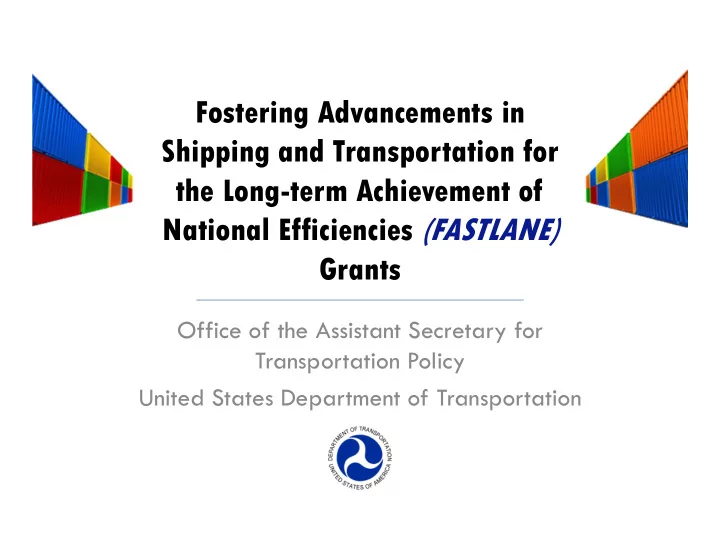

Fostering Advancements in Shipping and Transportation for the Long-term Achievement of National Efficiencies (FASTLANE) Grants Office of the Assistant Secretary for Transportation Policy United States Department of Transportation
FASTLANE Grants Overview • $4.5 billion authorized through FY 2020 – $800 million for FY 2016 • 25 percent for rural projects • 10 percent for small projects • Not more than $500 million in aggregate of the $4.5 billion for FY 2016 – 2020 can be used for freight rail, ports, or intermodal projects
Minimum Project Size Large Projects* – The lesser of: • $100 million • 30 percent of State’s FY 2015 apportionment, if project is located in one State • 50 percent of larger participating State’s FY 2015 apportionment, if project located in more than one State Small Projects* – Doesn’t meet large project minimum project size *Previously incurred expenses may count toward meeting minimum project size requirement if they are eligible project costs and were expended as part of the project for which the applicant seeks funding.
Grant Amounts and Cost Share • Minimum FASTLANE Grants – $25 million for large projects – $5 million for small projects • Cost Share – Up to 60 percent FASTLANE grants – Up to 80 percent total Federal Previously incurred expenses cannot count toward cost share
Program Requirements and Considerations • Large Project Requirements – Generates national or regional economic, mobility, or safety benefits – Cost-effective – Contributes to one or more 23 U.S.C. 150 goals – Based on the results of preliminary engineering – One or more stable and dependable funding or financing sources – Cannot easily be completed without Federal funding – Reasonably expected to begin construction 18 months from obligation • Small Project Considerations – Cost-effectiveness – Effect on mobility in the project’s State or region
Merit Criteria • Economic Outcomes – Improving efficiency and reliability to increase global economic competitiveness • Mobility Outcomes – Improving the movement of people and goods • Safety Outcomes – Reducing traffic fatalities and serious injuries • Community Outcomes – How and whether the project mitigates harm and extends benefits to communities and the environment
Other Review Criteria • Partnership and Innovation – Strong collaboration among a broad range of stakeholders – Innovative strategies to pursue outcomes • Cost Share – One or more funding sources
2016 FASTLANE Dates • March 25, 2016 : Applicants encouraged to email FASTLANEgrants@dot.gov with brief project information. • April 14, 2016 8:00 PM EDT: Applications submitted to www.Grants.gov
TIGER 2016 and FASTLANE Grants • Applicants can submit three applications per program • Same project can be submitted to both programs, but must submit separate applications that independently address how the project satisfies applicable selection criteria for the each program. – Note: the same application is unlikely to be competitive for both programs due to the different purposes and selection criteria.
+ 2016
+ 2 TIGER 2016 FY 2016 Appropriations Act signed into law by President Obama on December 18, 2015 $500 million for National Infrastructure Investments, similar to previous TIGER appropriations
+ 3 $500 million multimodal, merit-based discretionary grant program Strong focus on transformative projects and creating ladders of opportunity Modal and geographic equity requirements Project Information Form (No Pre-Application Requirement)
+ 4 How is the TIGER Program Different? Innovative Projects Leverages Resources Encourages Partnership Non-traditional grantees Merit-based awards Competitive Discretionary Grants
+ 5 What’s the Same in TIGER 2016? $500 million multimodal, merit-based discretionary grant program $100 million minimum for projects in rural areas $1 million minimum grant size for rural projects Federal share may exceed 80% for rural projects No standalone planning grants Modal and geographic equity requirements
+ 6 What’s New in TIGER 2016? $5 million minimum grant for urban areas (formerly $10 million) Grants may not be greater than $100 million (formerly $200 million) 20 percent maximum amount awarded to a single state (formerly 25 percent) Obligation deadline extended by one additional year, to expire September 30, 2019
+ 7 Eligible Applicants State, local, and tribal Metropolitan planning governments, including organizations U.S. territories Other political subdivisions of Transit agencies State or local governments Port authorities A collaboration among such entities
+ 8 Eligible Projects Highway and bridge projects Pedestrian and bicycle projects Public transportation projects Passenger and freight rail transportation projects Port infrastructure investments
+ 9 What Projects Compete Well? Demonstrated strength in selection criteria Projects which are difficult to fund elsewhere Strong partnership Strong match Project has timeline for success Presents a clear story and project impact
+ 10 Demand for TIGER Over seven rounds, six percent of applications have been awarded 6,727 applications received $135 billion requested 381 awards Most awards have been partial funding In TIGER 2016, we received 627 applications
+ 11 2016 TIGER Application Final Application – www.Grants.gov Final Applications – Must be submitted on or before 8:00 PM E.D.T. on April 29, 2016
+ 12 Technical Assistance TIGER Website: www.transportation.gov/tiger/ Special Topics Webinars: www.transportation.gov/tiger/outreach Tuesday, March 8, 2016 - 1:30-3:30pm - How to Compete for TIGER Discretionary Grants - All Applicants Tuesday, March 22, 2016 - 1:30-3:30pm - How to Compete for TIGER Discretionary Grants - Rural and Tribal Applicants Frequently Asked Questions: www.transportation.gov/tiger/faq Questions sent to TIGERGrants@dot.gov
Recommend
More recommend